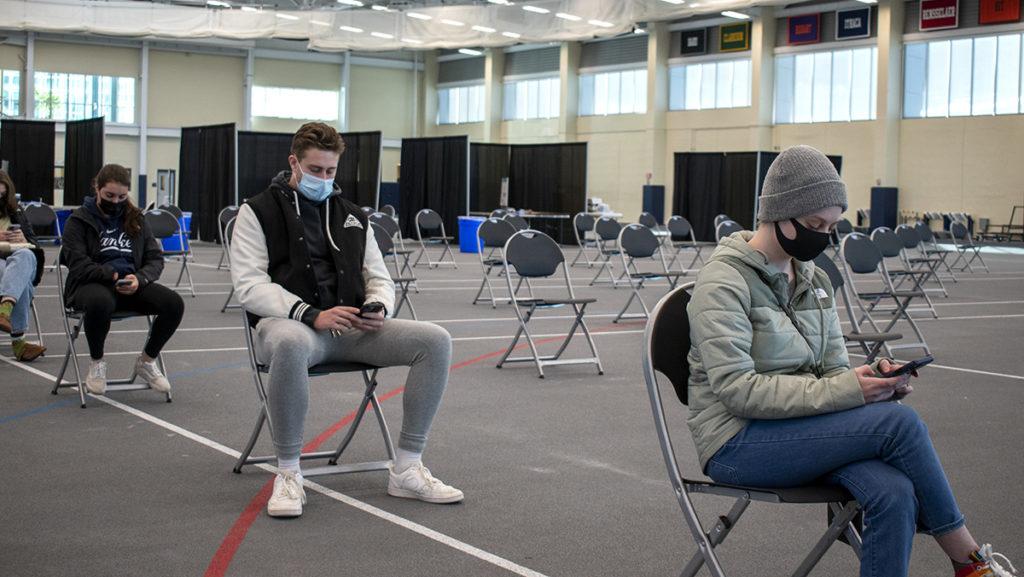Following a dramatic increase in COVID-19 cases in December 2021, Ithaca College has cautiously yet optimistically welcomed back its students, faculty and staff for Spring 2022.
As students prepared to leave the college for winter break in December 2021, a surge of COVID-19 cases hit the area. The rise in case numbers was attributed to Santacon, a large, unmasked holiday gathering Dec. 11 that the college warned students not to go to. The college shifted to an “Orange: Moderate Risk” alert status and 123 active student cases were reported Dec. 15 as well as four employee cases. Since the beginning of the spring semester, COVID-19 cases within the student body have remained low, resulting in the college changing its COVID-19 operating status to a “Green: Lower Risk” transmission level Feb. 4. As of Feb. 8, there are seven active student COVID-19 cases and nine active employee cases.
Samm Swarts, director of Emergency Preparedness and Response, said there was uncertainty of what to expect coming back. He said the decision to start Spring 2022 in a “Yellow: Low to Moderate Risk” alert status was because the college ended Fall 2021 at a higher risk for contracting COVID-19. He said the surge of cases in the winter also urged the college to revise the process of students returning to campus.
“We had no idea what campus was going to look like as soon as we started receiving students back to campus.” Swarts said.
On Jan. 7, the college alerted the campus community of the revised plans for Spring 2022. During the week of Jan. 24–28 classes were held remotely in order to allow for residential students to move in between Jan. 18–30, rather than the usual two day process. Students were required to take COVID-19 tests before moving in and upon returning to campus had to participate in a check-in process with a rapid antigen test at the Athletics & Events Center.
At the All-College Gathering on Feb. 2, Swarts reported that during the move-in process only 18 positive student COVID-19 cases were detected.
Junior Wren Perchlik contracted COVID-19 after checking into campus and quarantined in Emerson Hall between Feb. 1 and 6. He said he was glad when he learned of the revised plan for coming back to campus. He said he did not mind having a week of online classes and that it was for the best.
“There’s been more [COVID-19 cases] since [the All-College Gathering],” Perchlik said. “I am a bit worried that me getting COVID right away is representative of a larger trend on campus… It seems like you know, Omicron, it’s very contagious.”
The Omicron variant is much more contagious than the original virus and the Delta variant, according to the Centers for Disease Control and Prevention (CDC). The CDC states that while the vaccine greatly reduces the severity of symptoms, even vaccinated and asymptomatic people can spread the virus.
The student vaccination rate is 99% and has been since the start of Fall 2021. As of August 2021, 78% of faculty and staff were fully vaccinated and Swarts said the vaccination rate has increased since then with about 90% of employees being fully vaccinated coming into the spring semester. He said requiring employee vaccination and boosters would not have a big enough impact to necessitate making an employee mandate.
“I think people really saw the Omicron variant take shape and be very problematic for us in the fall,” Swarts said. “A lot of folks chose from an employee perspective to be vaccinated over the winter break. So that’s really great news.”
The deadline for students to receive their required COVID-19 booster is Feb. 15. While Swarts said there will not be a booster clinic on campus, he said the suggestion is to use local pharmacies which have appointments available.
Freshman Nyx Bhatt quarantined in Emerson Hall between Feb. 1 and 6 after contracting COVID-19 while traveling to campus from Bangalore, India. Bhatt said she has not gotten the booster yet. However, she said unlike her friends who have gotten the booster shot and were asymptomatic, she experienced flu symptoms while she had COVID-19. Bhatt also said she thinks the extended move-in process was a smart idea to reduce the amount of positive cases.
“A pandemic is like a huge cause of just anxiety and depression among students,” Bhatt said. “If you’re someone that’s prone to that, I would want to be surrounded by optimism, so I like that they’re [the college] being positive about it.”
David Gondek, associate professor in the Department of Biology, is on the college’s Health Safety Advisory Group and said that looking at past pandemics is a good way to understand the trajectory of COVID-19.
He said the 1918 influenza pandemic was majorly destructive, killing a total of 50 million people worldwide, according to the CDC. However, influenza eventually became the circulating flu for 40 years. So far, the COVID-19 pandemic has killed about 5.7 million people worldwide. Gondek said that this has all happened before with the respiratory syncytial virus which is now the common cold and that the pandemic is shifting into an endemic stage because the virus is going to circulate forever rather than appearing in small intense outbreaks.
“I think we will take our masks off this summer for sure,” Gondek said. “We may put masks on again next flu season, but I think that will be it. So by the flu season after that it’s just going to be part of society.”









